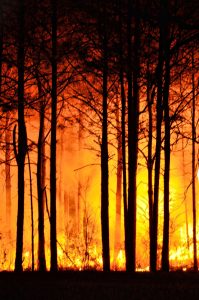Wildfires in Maine. What’s Next?
 The Maine Sustainability and Water Conference is happening once again on March 28th; we are returning to the topic of forestry for the first time since 2019, with our focus being on wildfires, as they have become a growing concern throughout North America. A lot has changed since then in terms of sustainability and climate. This forestry session will be a moment to reflect on the past, present, and future of Maine’s forests.
The Maine Sustainability and Water Conference is happening once again on March 28th; we are returning to the topic of forestry for the first time since 2019, with our focus being on wildfires, as they have become a growing concern throughout North America. A lot has changed since then in terms of sustainability and climate. This forestry session will be a moment to reflect on the past, present, and future of Maine’s forests.
Regions like Nova Scotia and Quebec have recently experienced some of their largest, most dangerous wildfires. This has directly affected many of us, as the smoke covered Maine throughout most of this past summer. The East Coast is vulnerable to wildfires; Maine is vulnerable. We cannot safely hide behind East-Coast weather anymore. Right now, we have a chance to prevent and prepare for damage that could affect our homes. Incredible work is being done with this in mind. This session, led by David Ludwig and Kent Nelson, will feature professionals from across the state; come learn about how climate change has impacted our forests, what is currently being done to change this, and what you can do to help protect the pine trees we place on our flags. Read further to see what each speaker will discuss during their talks.
The Danger for Maine
From 8:30 to 8:55 AM, listen to UMaine Farmington Professor Andrew Barton’s talk: “Should we worry about wildfires in Maine?” Maine has become increasingly vulnerable to wildfires. It is unlikely that one would spread throughout the state, but the impact of one could be severe. 19% of Maine’s 17 million forest acres feature housing, leaving many Mainers at a significant risk. Professor Barton will review the science of wildfires before examining their history in Maine to assess the state’s future wildfire risks.
The New, New England Heat
From 8:55 to 9:20 AM, hear Erin Lane, deputy director of USDA Northeast Climate Hub, talk about: “The Effects of Climate Change on Wildfires in New England.” Worsening droughts have been linked to climate change, increasing the severity and frequency of wildfires. Rising temperatures in the northeast U.S. have led to increased precipitation, but dry spells seem to have increased as well. Collected data do not suggest an increase in Maine droughts, but the dry spells are uniquely concerning. Come explore how the climate projections of our region could influence the seasonality, occurrence, risk, and management of wildfires.
Fires in Our Forests
From 9:20 to 9:35 AM, meet Maine Forest Service’s Andrew Whitman during his talk: “Impacts of Wildfire in Maine: Past and future.” His presentation will summarize the ecology of fire, its history, and the projected fire risk changes of Maine. Climate change could increase the risk of wildfires in Maine because of rising temperatures, increased drought risks, and reduced soil moisture. Whitman will analyze four driving factors of forest fire dynamics: climate, fuel, ignitions, and human activity. Their influence varies regionally, so changes in the frequency of wildfires could vary regionally as well.
Fire Fighting Efforts
From 9:35 to 10:00 AM, listen to forest specialists Kent Nelson and Matt Gomes detail ongoing actions in their talk: “Overview of wildfire suppression/prevention in Maine and grant opportunities.” There was a 25% increase in fire frequency throughout 2023. To combat this, the Maine Forest Service has increased its focus on fire prevention and detection; this has included increases in fire-service transportation, technology, and education for homeowners. The number of wildfires in Maine is projected to increase, so communities are being encouraged to apply for the USDA Forest Service’s Community Wildfire Defense Grant; this will help at-risk communities with planning for, and reducing, fire risks. The grant lasts five years and can be used for numerous fire risk projects.
Only We Can Prevent Wildfires
From 10:00 to 10:30 AM, join fire-service professionals Kent Nelson, David Daniel, and Bryan McLellan for a discussion panel about Community Wildfire Protection Plans and the implications of climate change on Maine wildfires. Community plans have been key to successful wildfire prevention, identifying a community’s risks and ways to alleviate them. These plans are crafted with the help of community fire professionals like our presenters .
An Important Moment
We are reaching a point in time where wildfire concerns need to be directly addressed in Maine communities, not just by emergency services. They are an issue that is estimated to worsen in the coming years; we need to prevent and prepare for them. This session will be an educational moment of reflection between peers, between Mainers, hoping to achieve the same goal. We want to keep The Pine Tree State safe for ourselves, our communities, and our future. Come listen to some of these talks and learn more about wildfires in Maine.
Kyle Willis is a Communications Intern with the Mitchell Center. Kyle is a senior undergraduate student majoring in English with a minor in Climate Sciences.
